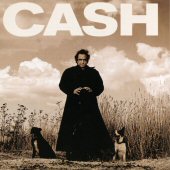 Johnny Cash – American Recordings (American) 1994
Johnny Cash – American Recordings (American) 1994
Last year he was invited to perform at a Billy Graham Crusade, Lollapalooza and Woodstock. He recorded an album featuring contributions from a diverse group of writers, ranging from notorious evilmeister Glenn Danzig to singing cowboy Roy Rogers. Johnny Cash continues to walk a solitary road.
Finding fame in the mid-fifties as one of Sun Record’s stable of rockabilly artists, he soon gravitated towards a more country-oriented sound. In the course of his career he has placed more than 150 songs on the country charts, 60 of which appeared on the pop charts as well. According to Billboard Magazine, he is the third most popular country artist in history.
The son of Southern Baptist sharecroppers, Cash has endured his share of hard times throughout a career that has been in out of fashion a numerous times. Thanks to alcohol and drug habits, he has landed in jail more that once. In 1967 he rededicated his life to Christ. Currently he is enjoying a popular resurgence similar to that of crooner Tony Bennett. Discovered by a new generation, his hip quotient has risen accordingly.
Cash’s latest release, American Recordings, is entirely acoustic, with his guitar providing the sole accompaniment. A compelling collection of songs ranging from stark, macabre tales to uplifting accounts of Christ’s redemptive power, it is justifiably being hailed as his best album in years.
“Delia’s Gone,” an original Cash first recorded in the sixties, is a fitting opener, showing the depths to which an individual can sink. Cash has penned some great new songs too: “Drive On” and “Redemption” in particular stand out. The cover songs seem to be custom made.
In fact, two were written specifically for this project: Glen Danzig’s “Thirteen” and Nick Lowe’s “The Beast in Me.” Others, including Kris Kristofferson’s “Why Me Lord,” Loudon Wainwright’s “The Man Who Couldn’t Cry” and even “A Cowboy’s Prayer,” an old Roy Rogers chestnut, fit Cash’s rugged baritone voice like a glove.
On a label that is home to such notorious acts as Slayer and Danzig, Cash has released a collection of songs that speak of humankind’s dark side, yet just as boldly tell of Christ’s redemptive power.
He is uncompromising in his defense of the Gospel, yet he is accepted by an audience that supports Nine Inch Nails, Porno For Pyros, and others who express hostility towards the Gospel. Why? He’s the real thing. Cash has seen the dark side of life, and he doesn’t sugar coat his message.
He recently appeared on a Billy Graham Crusade, dressed entirely in black. This is no attempt to follow trends. Cash began wearing black in the sixties as a symbolic protest of all that is wrong in our society, vowing to stop when things were as they should be. He appeared totally at ease, yet offered nary a smile. He came across as more trustworthy than most TV preachers. He understands the Gospel, accepts it, and attempts to live it. Matter of fact.
American Recordings is nominated for a Grammy Award, ironically as “best contemporary folk album” rather than in the country music category. Cash has won numerous Grammies as a country artist, is a member of the Nashville Songwriter’s Hall of Fame, and was elected to the Country Music Hall of Fame in 1980.
With acts like Garth Brooks and Billy Ray Cyrus topping the country charts today, however, Cash appears out of step.
It’s hard to find a connection between today’s top country stars and those who pioneered the music’s roots, such as Jimmie Rogers, The Carter Family, Bill Monroe, Bob Wills and Hank Williams.
It has taken people outside that genre to recognize the genius that the Nashville establishment takes for establishment takes for granted. Rolling Stone critics picked Cash as Best Country Artist of 1994.
Perhaps the Grammy award nomination is fitting after all; in the truest sense the above artists, as well as many who worked outside the country genre, such as Louis Armstrong, Leadbelly, Robert Johnson and Elvis Presley, could be considered true American folk artists. In this sense, Johnny Cash transcends country music, joining that elite group of artists whose music helps shape our lives.
© John Cody 1994